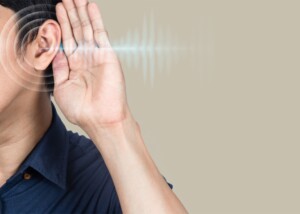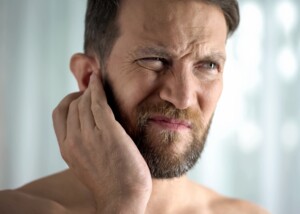
If you have TMJ disorder, you are at risk for hearing loss.
You may even already have some hearing loss and not even know it, all the while being cultivated by your temporomandibular joint disorder.
“Hearing loss and other ear symptoms are extremely common in TMJ disorders,” says Jeffrey Haddad, DDS, of Doolin Haddad Advanced Dentistry in Rochester, MI.
“The main facial muscles surround and connect to the area right in front of the ears where the TM joints meet the skull,” continues Dr. Haddad.
“There are numerous blood vessels, nerves and ligaments that exit and enter this area offering blood supply, innervation and support to the structures of the ears.
“When a person’s bite has been adversely affected by bruxism, parafuction [abnormal oral movement], excessive dental work or even improper orthodontics, it can cause muscular tension in these areas.
“If this tension compresses these very sensitive nerves and blood vessels around the ears, symptoms like ear ringing, ear congestion (blockage), hearing loss and vertigo (dizziness) can occur.”
Solution to Hearing Loss Caused by TMJ Disorder
Dr. Haddad explains, “By stabilizing and properly supporting a person’s jaw in a muscularly relaxed and comfortable position, we decompress the area around the joints and ears, allowing healthy physiology to occur and symptoms to be relieved.”
Another Possible Cause of Hearing Loss Linked to TMJ Disorder
“Meniere’s disease is a common disorder of the inner ear that affects over 615,000 people in the U.S.,” says Dr. Haddad.
“It causes episodes in which you feel as if you’re spinning (vertigo), and you have fluctuating hearing loss, ringing in the ear (tinnitus), and sometimes a feeling of fullness or pressure in your ear.
“It is a very frustrating condition because as of now, there is known root cause or cure available.
“However, several studies have shown a direct connection between Meniere’s disease and temporomandibular disorders (TMD), which share many of the same debilitating symptoms.”
Signs and symptoms of Meniere’s disease include:
• Hearing loss. “Hearing loss in Meniere’s disease may come and go, particularly early on,” says Dr. Haddad. “Eventually most people have some permanent hearing loss.”
• Recurring episodes of vertigo which can start and stop spontaneously. “Episodes of vertigo occur without warning and usually last 20 minutes to several hours, but not more than 24 hours,” says Dr. Haddad. “Severe vertigo can cause nausea and vomiting.”
• Tinnitus: subjective perception of sounds in the ear such as a high pitched tone, hissing, buzzing or crackling.
• Feeling of fullness in the ear. “People with Meniere’s disease often feel pressure in the affected ears (aural fullness) or on the side of their heads.”
TMJ Disorder and Meniere’s Connection
“What is striking is that every one of the symptoms of Meniere’s disease are commonly found with TMD,” says Dr. Haddad.
“Tinnitus, pain or pressure in the ears and dizziness, tension headaches, neck pain and migraines also seem to go hand in hand with patients suffering from Meniere’s disease.
“This could actually be a direct result of a misaligned bite or underlying TMJ disorder.”

Dr. Haddad lectures nationally on cosmetic dentistry, TMJ disorders and practice marketing, and utilizes the latest technology to ensure the utmost in patient comfort and care.
 Lorra Garrick has been covering medical, fitness and cybersecurity topics for many years, having written thousands of articles for print magazines and websites, including as a ghostwriter. She’s also a former ACE-certified personal trainer.
Lorra Garrick has been covering medical, fitness and cybersecurity topics for many years, having written thousands of articles for print magazines and websites, including as a ghostwriter. She’s also a former ACE-certified personal trainer.
.









































